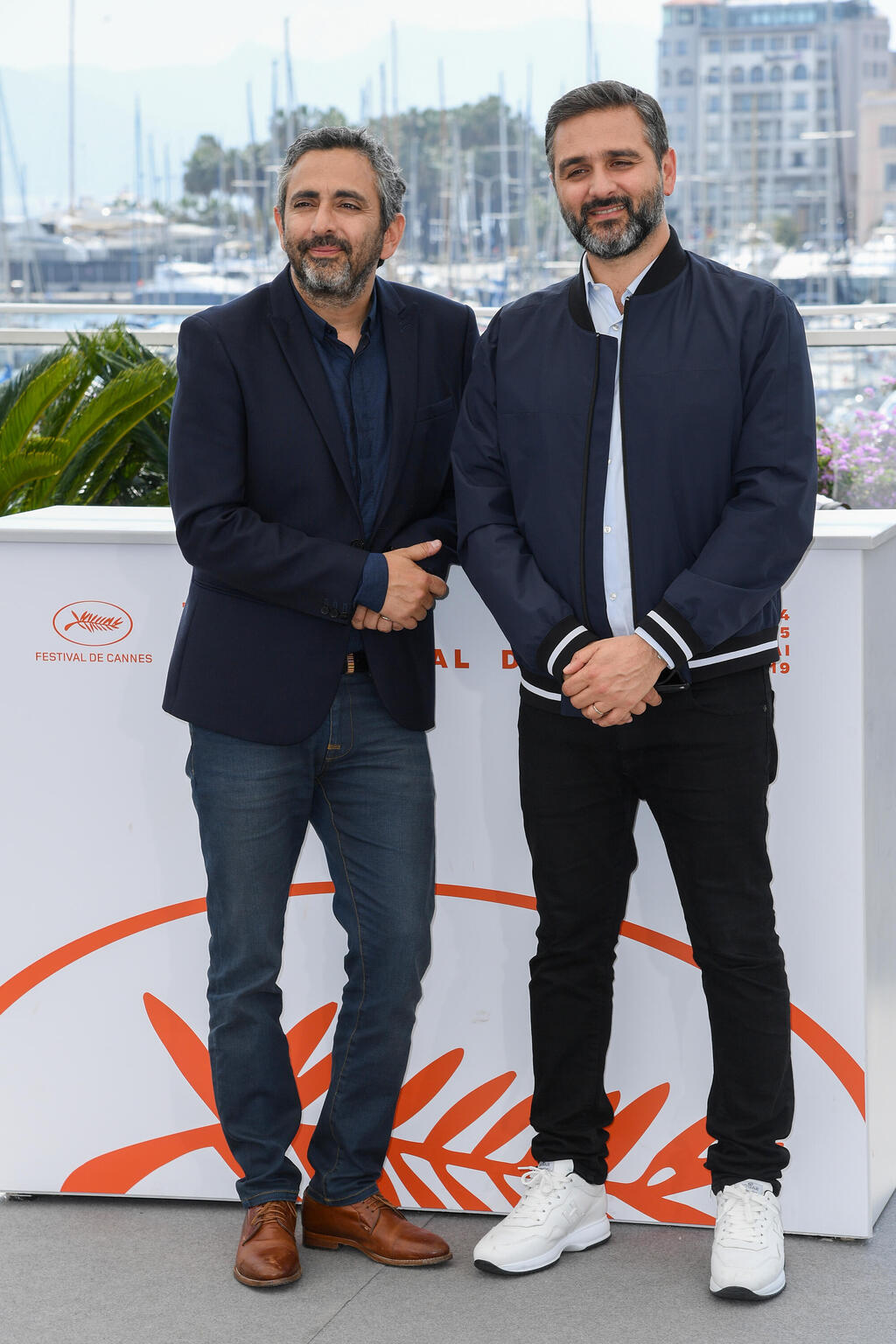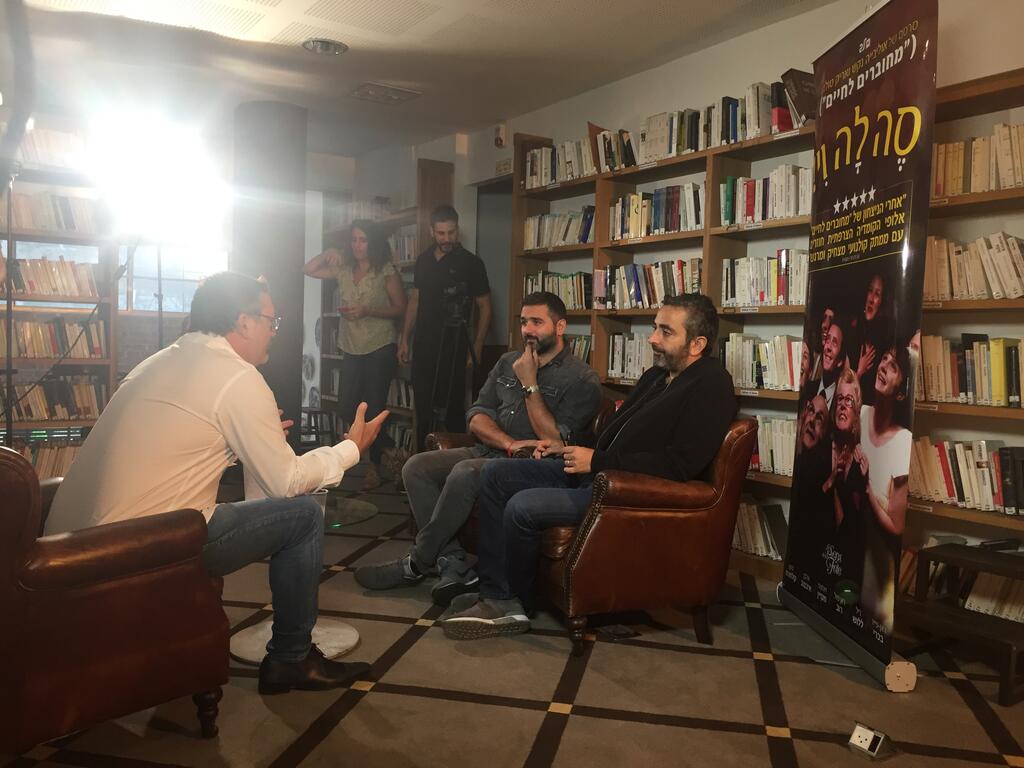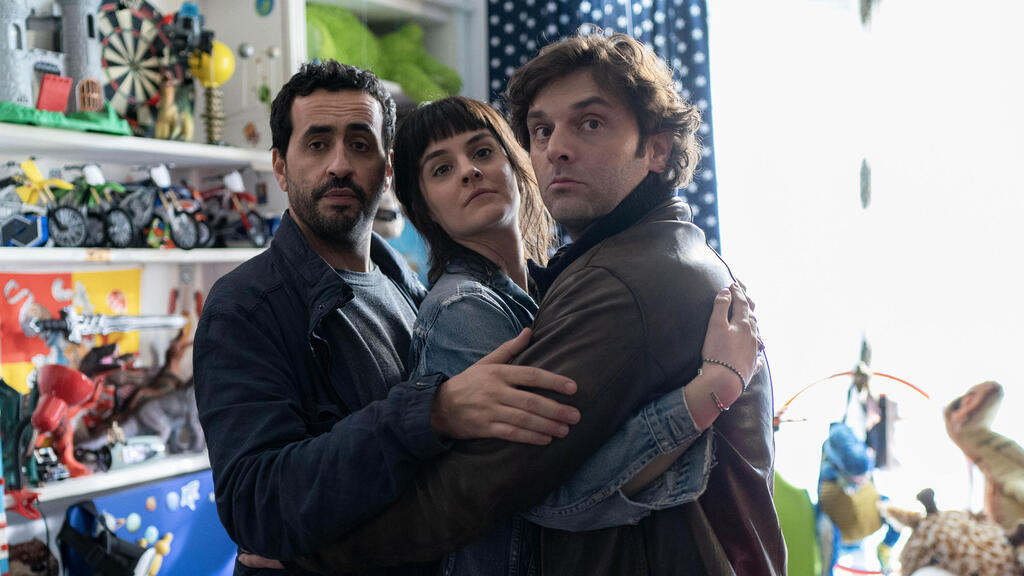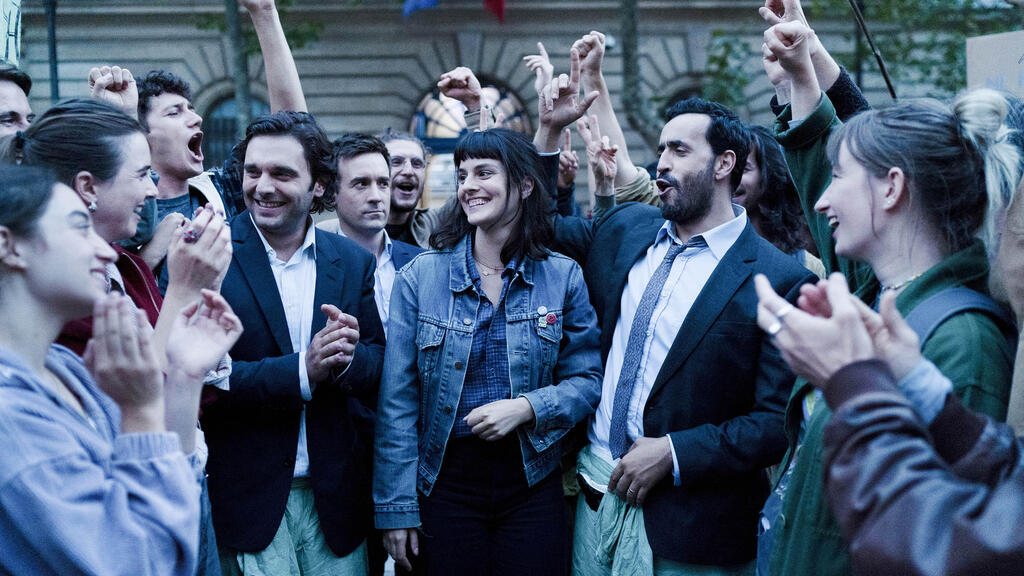On October 7, renowned Jewish filmmakers Éric Toledano and Olivier Nakache were in the midst of an intense PR campaign for their new film A Difficult Year which was set to be released that week. However, their focus quickly shifted when news of the devastating Hamas attack reached them, causing deep concern for their families in Israel. Amid this turmoil, they had to navigate interactions with French media.
Read more:
Recalling the challenging experience, Toledano shares, "We were touring and it was about the end. We were guests on TV in France just after the breaking news at eight. And all the breaking news was about the attack in Israel, so we were terrified and the journalist asked us, 'how do you feel'?"
Nakache and Toledano not only had to navigate the challenges of the media and the promotion of their film but also faced personal tragedies and losses during that time.
"My cousin, Alon Amram Toledano, was tragically killed in Sderot on October 7," Toledano recounts in pain. "He was on his way to a synagogue when he was shot."
Nakache also experienced a devastating loss that day. "My wife's cousin, Hilly Solomon, who was only 27 years old, was shot while hiding under a car after fleeing a party in Re'im. It was a nightmare. It took five days to confirm whether Hilly was alive or not. She had managed to escape, but unfortunately, she was ultimately murdered along with Maayan Adam, her best friend and Maayan Adam's sister."
The filmmakers had to endure immense personal grief alongside the challenges they faced in the public sphere. In December, Nakache and Toledano made their way to Israel to visit their families.
Nakache explains the significance of their visit. "It is important for us to show support during this terrible time." He specifically came to console Solomon's family, expressing, "It's not usual to come here during a war, but like Éric said, for us it takes one second to say no, no need to cancel. We want to come and we are also connecting to this."
Their visit to Israel during this challenging period held personal significance and a desire to be present for their loved ones and the nation.
Toledano emphasizes that there was no hesitation in their decision to come to Israel during the war. "There was no dilemma whatsoever. We were never afraid. We have always followed the path of cinema, going wherever it takes us. It is always better to gain an understanding of the world by being in close proximity to the events."
During their visit, the directors decided to meet with families of hostage held in Gaza. Nakache reflects on the experience. "We can empathize with their pain. We have been to Tel Aviv many times before, but this time, the atmosphere felt heavy and somber."
Toledano agrees, adding that the encounter felt like a poignant moment frozen in time. "There is no doubt that the city has changed. The sadness is visible on people's faces."
During their visit, Nakache and Toledano also had the opportunity to meet with friends, including director Hagai Levi and Dafna Levin. Reflecting on their conversations, Nakache shares, "We had extensive discussions with them about the impact of the attack on October 7. Hagai presented us with evidence and made a valid point that Israelis are now caught in a situation that cannot be reversed."
Toledano adds that, like many others, they also engaged in volunteering activities during their visit. "We went to a village near Lod to help pick lemons. While we were in the midst of picking, suddenly an alarm went off, and we quickly took cover under one of the trees. From there, we witnessed interceptions in the sky."
During their journey, Israeli movie theater chain Lev Cinema organized a special pre-premiere screening of A Difficult Year for residents of southern Israel who were displaced by the war.
"We believed that providing comedy to the evacuees would be beneficial. We wanted to offer people two hours to breathe and divert their thoughts to something else," Toledano says.
"The reactions we received were incredibly moving. The film was originally created to spark discussions about excessive consumption and ecological issues. However, in light of the October 7 attack, the meaning of the film took on a new dimension. Suddenly, it served as a bubble, allowing people to momentarily escape the news, think about something else, and perhaps find laughter. It's important to find moments of laughter, regardless of the situation."
A Difficult Year is a comedy about two losers, played by Pio Marmaï and Jonathan Cohen, who realize that their heavy debts are spiraling out of control. In their attempt to reset and get back on the right track, they encounter a group of activists fighting for environmental causes and decide to join their initiatives, including the fight against "Black Friday," overconsumption and the climate crisis.
At first, they do it mainly for the free beer and snacks distributed during the group meetings, but as they engage in activities and protests, and thanks to the passionate and determined activism of one member, portrayed by Noémie Merlant, their lives start to change.
"The idea for the film came during the time of the coronavirus," reveals Toledano. "We were in a market event of such global magnitude, and at that time, all the speeches in the media talked about the 'world after,' hoping it would be better. In general, we were all discussing ecological issues and whether we consume too much. Then we received a message from our company that we had to stop working. We felt like little kids being punished and having to stay at home and think about our actions. So, we thought about old Italian comedies and how they would deal with such a global event."
In preparation for the script-writing process, Nakache and Toledano conducted extensive research on activism. "We went to Extinction Rebellion. You get climate activists and we decided to make an immersion during one or two months with pay, lower taxation..."
Did you change your mind about activism?
"Sure. Not only were all the extras in the film real activists, but we also lived and ate with them during the filming, and they were actively involved in the process, so it definitely changed our perspective," says Nakache.
Toledano adds and shares about the discussions that took place during the waiting time on set, which were particularly interesting. "Sometimes they were ridiculous, like everyone else, but we didn't laugh at them in the film. We decided to portray them in both positive and negative ways, as well as the people who rush to stores on Black Friday for television sets. When you observe Black Friday, it's not the most cautious portrayal of human beings - seeing them like animals, screaming, and many of them. It's excessive consumerism, but it's part of our behavior and way of living. We want a lot of things. As the film says, 'If you buy something now, you have to ask yourself if you really need it.'"
Toledano adds that the change is visible among the younger generation. "The logic here is not the same. We were born and raised in the '70s, so we were teenagers around about '85. OK, in '85 you were born, you wake up in the morning. The more you consume, the more you accumulate things, the more happy you are. There is no issue. And now you wake up in a new world."
Israel was disappointed in Greta Thunberg, who participated in pro-Palestinian demonstrations and called to 'crush Zionism.'
"This is the problem with the left, they hate Israel," explains Toledano. "It's the same thing with the extreme left in France. Most people don't know the history. I've heard many young people say, 'Why is Israel attacking with such force?' and I want to answer, 'Put your country in the same situation as Israel.' They know nothing about the establishment and creation of the State of Israel and the Zionist movement. This is the problem of our time, where nuance disappears. This generation is a generation of 'like' or 'dislike.' Everything is black or white."
According to Nakache, the younger generation is characterized by the bubble they create for themselves, which only includes people who think the same way. "And of course, there is also the issue of AI-generated images. For example, the pictures of the child from Gaza - they are completely fake. But how do you explain that to people who say it's not fake? It's simply impossible. Even social media has become its own bubble."
Is it hard being a Jew in France?
"Yes, of course, because you know that in France you have a big Jewish community. Big Muslim community also. And we live together. There's a special history of France with the migration of Paris from Algeria."
Toledano, 52, and Nakache, 50, met at a summer camp in the 1980s, and according to their conversations, they have been friends since adolescence. That friendship gave birth to a cinematic partnership in which they made films together, such as 2006's Those Happy Days and 2009's Tellement Proches.
But then came 2011's The Intouchables, which became one of the biggest hits in French cinema history and completely changed their careers. The film was based on the true story of Philippe Pozzo di Borgo, a French millionaire from an aristocratic family, who became paralyzed following a paragliding accident and developed a special relationship with his Algerian-Moroccan caregiver, Abdel Sellou, who was originally from the suburbs of Paris and had his identity changed to Senegalese in the film.
The movie starred François Cluzet and Omar Sy and became a social phenomenon, with 19 million French people flocking to see it. It sparked debates and controversies, and even then-president Nicolas Sarkozy held a grand screening at the Élysée Palace, while Jean-Marie Le Pen, founder of the far-right anti-immigration National Front party, expressed his disdain and rejection of the film. The movie also won awards, was sold to 40 countries, and received a Hollywood adaptation starring Bryan Cranston. The Intouchables broke records in Israel as well and the Cameri Theater presented a play based on the film.
Di Borgo, who was the inspiration for the film, passed away last June, which was a difficult experience for both of them. "It was tough, we remained very close to him," says Toledano.
"We saw him for the last time at the opening of a new wing in the hospital, where he spent a long time. He was a role model for many, a light that gave hope to others. He changed the perception of disability and people confined to wheelchairs. By the way, I'm not sure if The Intouchables could be made today with the prevailing political correctness that weakens the world. It contains edgy jokes; it's important for us to laugh about serious things, and in The Intouchables, we truly did that - we laughed at racism and the fear of disability. We need to laugh at what we fear; it's like medicine. If we don't do it, we become sick. Laughter allows an escape from the dramatic, like opening a window."
Is the movie's success a blessing or a curse?
"I remember that President Sarkozy said to us, 'Look at this film as a lighthouse in your lives that illuminates all your other films,'" Toledano recounts. "This can definitely be a problem if you can't break free from the shadow. We struggled to emerge from that shadow because when you achieve such success, it's great news, but you also need to break free, choose new freedoms, and address different subjects and issues. That's why we decided to make The Specials, which deals with autism, and after that Samba, which tackles a topic that we believe is important for France to consider. So now we are not only known for The Intouchables, we can breathe."
Nakache claims that success is, among other things, also a blessing. "It helps that we are together; if it was someone else, maybe it would be difficult to let go of such success. It's a tremendous storm that carries you away, and you're not ready to let go of something like that," he argues.
Toledano adds that despite traveling to Hollywood, meeting people and riding roller coasters, they are still not like other American directors. "We are not like Spielberg, whose goal is to be global. We talk about French society and observe it. Now we are working on a film about the period when we were adolescents. We want to show young people the world without cellphones, to preserve the era we left behind."
How did your relationship change over the years?
"We remain curious and surprised," Nakache reveals. "And we also incorporate a little bit of each of us into the characters, as well as the dynamics of our friendship. We are very comfortable placing two men at the center of our films, and this time, in A Difficult Year, we decided to also include a woman. So, this time it's not a duo, but a trio."
You usually intersperse dance scenes in your films, which also happens in A Difficult Year where the waltz scene seals the film. What does dance mean to you?
"We are terrible dancers, like catastrophically so, but we feel that dancing is an expression of an emotion that cannot be touched. Dance allows you to be who you are and feel confident. Specifically in this film, dance symbolizes the waltz of conflicting ideas about overconsumption and the understanding that we need to dance together in order to cope with our future. The waltz is a way for us to talk about how ideas transition from one to another. In the '80s, consumer culture was not a problem, but today we live in a world where we must think about consumption in a more ecological and responsible way.
"In dance, we're not always in the same place, we don't always believe in the same thing, but we're on the same planet and need to dance together. One of the viewers in France said after the screening that he felt we were on a bridge between worlds and didn't know which foot to dance on. That feeling is correct about our films - we don't come to preach morality, convey an absolute idea, or tell the viewer what to feel. For us, dance is a kind of poetry, and it's important for us to give space for poetry and humor. Dance, in this sense, is an attempt to preserve optimism and hope."






